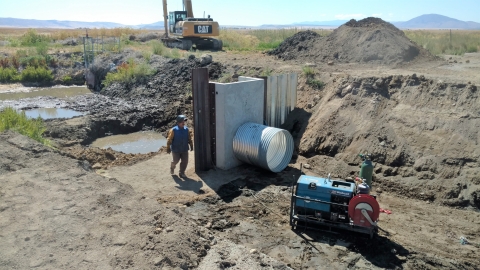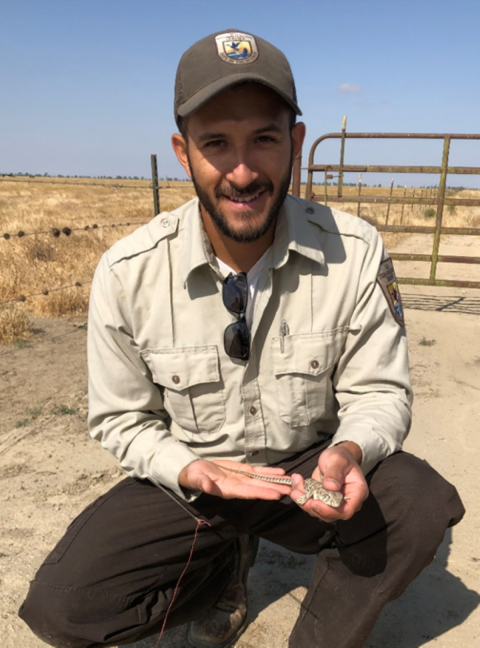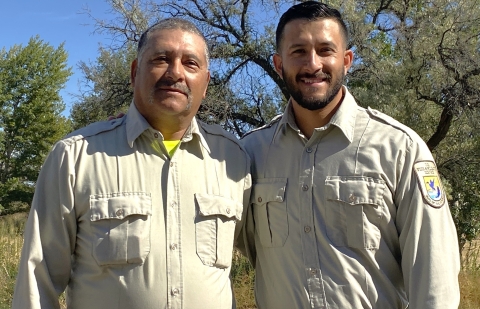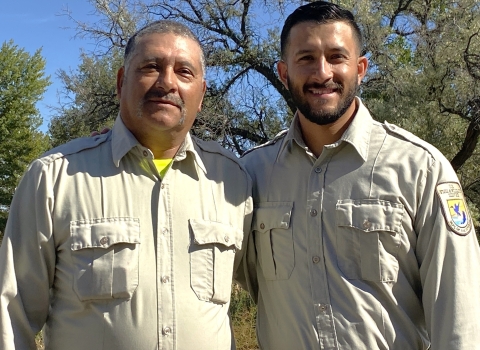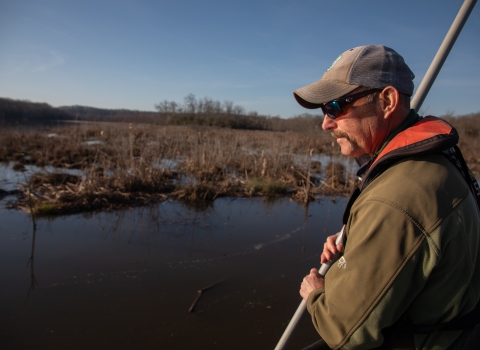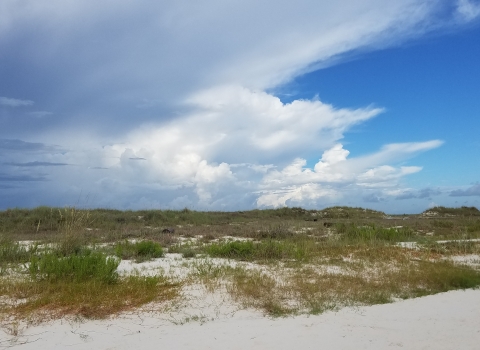When Jesus Jimenez first immigrated to the United States from Mexico at 17-years-old, he could have never anticipated the ripple effects his career with the U.S. Fish and Wildlife Service would have on his future family. Nearly 45 years later, three of his four children now work as federal employees. Recently, his youngest, Miguel, was selected as the project leader for the Kern National Wildlife Refuge Complex.
Originally from Jalisco, Mexico, Jesus spent his youth tending to land and managing his family’s farm. In the late 1970s, he relocated to Santa Ana, California, where his uncle was residing at the time. Jesus found a temporary job on a potato farm during the fall, but opportunities for work were limited during the winter.
From Santa Ana, Jesus journeyed to Fresno, California, eager to find more stable employment. Through the relationships he established with local farmers, Jesus was informed of another short-term work opportunity further north. In 1984, Jesus arrived in Tulelake, California where he would soon meet his wife, Maria.
“No es fácil cuando uno llega a este pais sin conocer a nadie,” stated Jesus. [It’s not easy when you arrive to this country without knowing anyone.]
With the birth of his four sons, Guadalupe, Jesus Jr., Hector, and Miguel, the mounting pressures of providing for his family intensified. Jesus would spend his days operating heavy machinery for long hours in order to make a living. But his overnight schedule would pull him away from what he valued the most: his wife and children.
“Yo quería tener tiempo para estar con mi familia porque uno de mis hijos me preguntó un día si me venía a dormir a la casa porque nunca me veía,” explained Jesus. “Me iba a las 3:30 de la mañana y tenía que regresar a las 9 de la noche.” [I wanted to spend more time with my family because one day, one of my sons asked me if I would sleep at home since he never saw me there. I’d leave for work at 3:30 a.m. and return home at 9 p.m.]
Ready for a career shift, Jesus learned of another opportunity that would hopefully lead to an improved quality of life. In 2001, during the widespread drought in the Klamath Basin, government programs were created to assist communities impacted by the crisis, including seasonal work at local refuges. In light of this news, Jesus applied and began working at the nearby Tule Lake National Wildlife Refuge.
Established in 1928, Tule Lake National Wildlife Refuge was designated as a preserve and breeding ground for wild birds and animals. Tule Lake is now one of six national wildlife refuges that comprise the Klamath Basin National Wildlife Refuge Complex. These refuges have a unified mission to conserve what was once the largest area of wetlands west of the Mississippi River. Today, the remaining wetlands in the Klamath Basin are critical to migrating water birds along the Pacific Flyway.
On his first day of work at the refuge, Jesus was told to rake leaves throughout the grounds, an assignment that was expected to take all day. Within a few short hours, he completed this task. The next morning at 6 a.m., Jesus operated a dump truck for a local project. Through a variety of maintenance projects, he gained technical and specialized knowledge and acquired a valuable skillset. Furthermore, Jesus supplied much needed assistance in the field and provided meaningful contributions to the Partners for Fish and Wildlife Program.
“A mí me calaron a trabajar en un lado y en otro,” said Jesus. “Me gustaba andar y no estar sentado nada más.” [They had me working at various locations. I liked that I was able to move around and not just sit all day.]
As the weeks progressed, Jesus began to appreciate the work-life balance that was once absent from his life. The joy he experienced was lifechanging and the professional relationships he developed were positive. With motivation from his co-workers, Jesus was encouraged to pursue permanent placement with the Service.
But his journey to federal employment would not unfold without a series of challenges. Jesus encountered a roadblock when he discovered that U.S. citizenship is a requirement to qualify for permanent or temporary (competitive status) employment with federal agencies. While seasonal employment can serve as a gateway to permanent federal service, candidates must meet the appropriate qualifications and requirements. And as a legal permanent resident, Jesus would remain limited to seasonal work with the Service. Undeterred, he enrolled in evening classes at a local high school to improve his English and study for the U.S. citizenship test. It would take several months of continued practice and a failed first attempt before successfully obtaining his U.S. citizenship in 2003.
Four years of intermittent work would finally reach an end in 2007, when an equipment operator position with the Service was advertised on USAJobs. Under the Partners for Fish and Wildlife Program, the selected candidate would support restoration projects in the Klamath Basin by operating heavy equipment. Jesus took the leap, applied for the position and was selected for the role. On December 7, 2023, Jesus will celebrate 16 years of permanent employment with the Service, a fulfilling career that he never envisioned growing up in the farmlands of Mexico.
“Mi trabajo con el Programa de Socios era importante porque los árboles que yo plantaba eran para los mismos pájaros,” reflected Jesus. “También para proteger la Tierra.” [My job with the Partners Program was important because I was planting trees for the birds. This work was also helping to protect the riverbank from erosion.]
Jesus transitioned into his current role with the refuges program two years into his career with the Service. As an engineering equipment operator, he continues to operate heavy machinery throughout the refuge, perform infrastructure repairs, and conduct heavy equipment and vehicle maintenance. His combined 22-year commitment to conservation began to shape his family dynamic and impact the lives of his children.
By his early teenage years, Jesus’ youngest son, Miguel, had grown fond of hunting and fishing with his family. His father’s connection to the refuge inspired him to initially consider a career as a refuge law enforcement officer. As an undergraduate student at California State University, Sacramento, Miguel pivoted to a biological sciences track. With support from his father, Miguel became aware of an internship opportunity as a biological technician at Tule Lake. He interned with the Service for four consecutive years before obtaining permanent status as a wildlife refuge specialist at Kern National Wildlife Refuge in 2014.
“La influencia de mi padre fue de cuando él trabajó en el campo,” said Miguel. “Siempre nos llevaba los fines de semana y por su ejemplo, aprendimos a trabajar. Yo aprendí de las oportunidades y pude enfocarme en esta carrera, gracias a él. Si no fuera por la experiencia de mi padre con el Servicio, sería mucho más difícil para mí poder enterarme y ejercer en esta carrera.” [My father has had an influence on me since he worked in the fields. He would always take us with him on weekends and from his example, we learned how to work. I learned about different opportunities and was able to focus on getting into this career, thanks to him. If not for my father’s experience with the Service, I think it would have been much more difficult for me to get into this field further down the line.]
Now the project leader at the Kern National Wildlife Refuge Complex in Delano, California, Miguel is heavily involved with the inner workings of refuge management. His three older brothers have also excelled in their respective careers as an air traffic controller, building superintendent and maintenance professional.
“Yo me siento muy orgulloso de ver que mis hijos han progresado,” stated Jesus. “El trabajo y esfuerzo de seguir adelante y llegar a donde están, yo no lo hice solo. Claro, fue con mi esposa porque ella siempre me apoyó en todo.” [I am very proud to see how far my sons have progressed. The work and effort of pushing forward and helping them get to where they are isn’t something I did alone. My wife and I did it together, of course. She has always supported me in everything I do.]

